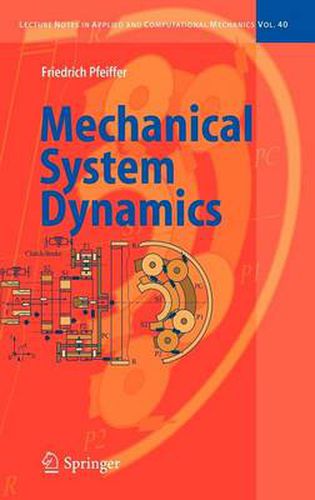Readings Newsletter
Become a Readings Member to make your shopping experience even easier.
Sign in or sign up for free!
You’re not far away from qualifying for FREE standard shipping within Australia
You’ve qualified for FREE standard shipping within Australia
The cart is loading…






This title is printed to order. This book may have been self-published. If so, we cannot guarantee the quality of the content. In the main most books will have gone through the editing process however some may not. We therefore suggest that you be aware of this before ordering this book. If in doubt check either the author or publisher’s details as we are unable to accept any returns unless they are faulty. Please contact us if you have any questions.
Mechanics as a fundamental science in Physics and in Engineering deals with interactions of forces resulting in motion and deformation of material bodies. Similar to other sciences Mechanics serves in the world of Physics and in that of Engineering in a di?erent way, in spite of many and increasing inter- pendencies. Machines and mechanisms are for physicists tools for cognition and research, for engineers they are the objectives of research, according to a famous statement of the Frankfurt physicist and biologist Friedrich Dessauer. Physicists apply machines to support their questions to Nature with the goal of new insights into our physical world. Engineers apply physical knowledge to support the realization process of their ideas and their intuition. Physics is an analytical Science searching for answers to questions concerning the world around us. Engineering is a synthetic Science, where the physical and ma- ematical fundamentals play the role of a kind of reinsurance with respect to a really functioning and e?ciently operating machine. Engineering is also an iterative Science resulting in typical long-time evolutions of their products, but also in terms of the relatively short-time developments of improving an existing product or in developing a new one. Every physical or mathematical Science has to face these properties by developing on their side new methods, new practice-proved algorithms up to new fundamentals adaptable to new technological developments. This is as a matter of fact also true for the ?eld of Mechanics.
$9.00 standard shipping within Australia
FREE standard shipping within Australia for orders over $100.00
Express & International shipping calculated at checkout
This title is printed to order. This book may have been self-published. If so, we cannot guarantee the quality of the content. In the main most books will have gone through the editing process however some may not. We therefore suggest that you be aware of this before ordering this book. If in doubt check either the author or publisher’s details as we are unable to accept any returns unless they are faulty. Please contact us if you have any questions.
Mechanics as a fundamental science in Physics and in Engineering deals with interactions of forces resulting in motion and deformation of material bodies. Similar to other sciences Mechanics serves in the world of Physics and in that of Engineering in a di?erent way, in spite of many and increasing inter- pendencies. Machines and mechanisms are for physicists tools for cognition and research, for engineers they are the objectives of research, according to a famous statement of the Frankfurt physicist and biologist Friedrich Dessauer. Physicists apply machines to support their questions to Nature with the goal of new insights into our physical world. Engineers apply physical knowledge to support the realization process of their ideas and their intuition. Physics is an analytical Science searching for answers to questions concerning the world around us. Engineering is a synthetic Science, where the physical and ma- ematical fundamentals play the role of a kind of reinsurance with respect to a really functioning and e?ciently operating machine. Engineering is also an iterative Science resulting in typical long-time evolutions of their products, but also in terms of the relatively short-time developments of improving an existing product or in developing a new one. Every physical or mathematical Science has to face these properties by developing on their side new methods, new practice-proved algorithms up to new fundamentals adaptable to new technological developments. This is as a matter of fact also true for the ?eld of Mechanics.